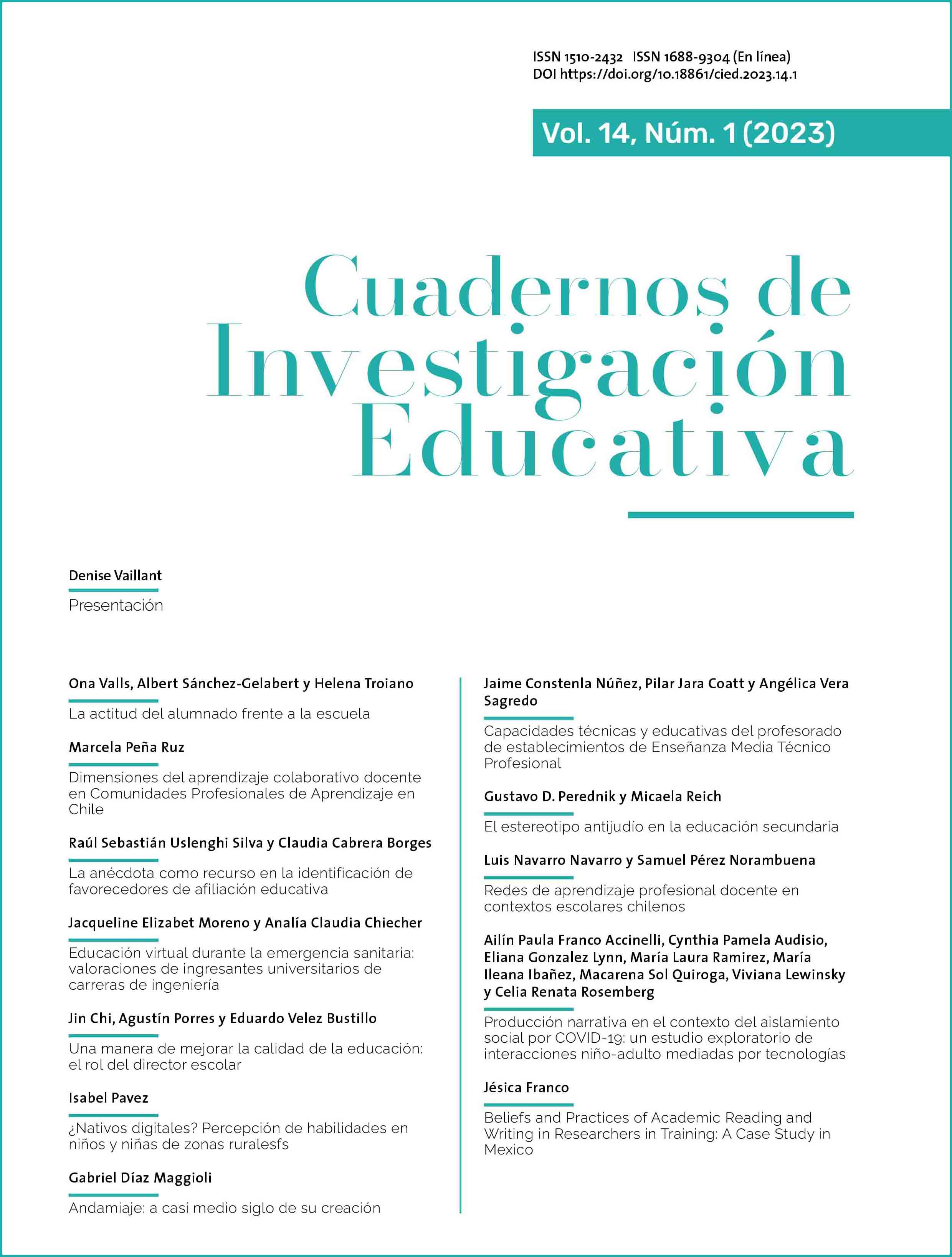Anti-Jewish stereotype in high-school education
DOI:
https://doi.org/10.18861/cied.2023.14.1.3294Keywords:
prejudice, adolescence, Jews, antisemitism, Judeophobia, values, moral, high schoolAbstract
Group stereotypes are social representations in the form of ideas or beliefs on which group hatreds are usually based. One of these group hatreds is antisemitism or Judeophobia, which is scarcely addressed despite its verifiable presence. The reason for this scarcity may be related to the phenomenon's complexity. In general terms, all stereotypes constitute a fertile field for education to the extent that they are cognitive. In order to detect group stereotypes, adolescence is an appropriate age because moral judgment is already formed, and treating them could contribute to Values Education at this evolutionary stage. A self-report questionnaire was administered to 321 students between 16 and 18 years old in four cities in three South American countries. In addition, interviews with specialists were conducted. The students consulted had not had direct contact with Jews at the time of the study. The managing questionnaire was based on the premises of the Implicit Association Test, and it aimed to elicit words associated with the voice "Jew". The results show that almost half of the associated terms had a negative connotation linked to the notion of domination. Including some explanations of this phenomenon in the school curriculum may help mitigate it.
Downloads
References
ADL (Anti–Defamation League) (2014). ADL Global 100 – An Index of Anti-Semitism. http://global100.adl.org/
Alaminos Chica, A., & Castejón Costa, J. L. (2006). Elaboración, análisis e interpretación de encuestas, cuestionarios y escalas de opinión. Editorial Marfil.
Allport, G. W. (1954). La naturaleza del prejuicio. Eudeba.
Banks, J. (Ed.) (2012). Encyclopedia of Diversity in Education. SAGE.
Beattie, G. (2013). Our Racist Heart? An Exploration on unconscious prejudice in everyday life. Routledge.
Beelmann, A., & Heinemann, K. (2014). Preventing prejudice and improving intergroup attitudes: A meta–analysis of child and adolescent training programs. Journal of Applied Developmental Psychology, 35, 10-24. https://doi.org/10.1016/j.appdev.2013.11.002
Bodenhausen, G., & Richeson, J. (2010). Prejudice, Stereotyping, and Discrimination. In R. F. Baumeister & E. J. Finkel (Eds.), Advanced Social Psychology (pp. 341–383). Oxford University Press.
Boyd, D. (2013). Moral Education within Difference: Impediments to Appreciating the Moral Other. Hare & Portelli.
Brown, R. (1995). Prejudice - Its Social Psychology. Backwell.
Cárdenas, M., Music, A., Contreras, P., Yeomans, H., & Calderón, C. (2007). Las nuevas formas de prejuicio y sus instrumentos de medida. Revista de Psicología, 16(1), 69-95. https://doi.org/10.5354/0719-0581.2007.18435
Centro Kantor (2020). Universidad de Tel Aviv: informe anual.
Davies, C. (1990). Ethnic humor around the world: A comparative analysis. Indiana University Press. https://doi.org/10.1086/229737
Dion, K. (2001). The Social Psychology of Perceived Prejudice and Discrimination. Canadian Psychology, 45(1), 1-10.
Fiske, S. (2013). What Does Prejudice Reveal About What It Means to be Human? En J. A. Smith (Ed.), Berkeley Annual Conference sobre La ciencia y el misterio de la experiencia humana.
Fiske, S. (2016). Tabla de Fiske en The Fiske Lab. http://www.fiskelab.org/
Foxman, A. (2010). Jews and Money: The Story of a Stereotype. Palgrave Macmillan.
Freeman, D., Loe, B. S., Chadwick, A., Vaccari, C., Waite, F., Rosebrock, L., Jenner, L., Petit, A., Lewandowsky, S., Vanderslott, S., Innocenti, S., Larkin, M., Giubilini, A., Yu, L. M., McShane, H., Pollard, A. J., & Lambe, S. (2020). COVID–19 vaccine hesitancy in the UK: the Oxford coronavirus explanations, attitudes, and narratives survey (Oceans) II. Psychological medicine, 1-15. https://doi.org/10.1017/S0033291720005188
García Venturini, J. L. (1964). Antisemitismo y cristianismo. Revista Comentario.
Gartner, L. (2001). History of the Jews in Modern Times. UP.
Gendler, T. (2008). Alief and Belief. Journal of Philosophy, 105(10), 634-663. https://doi.org/10.5840/jphil20081051025
Hughes, C. (2017). Understanding Prejudice and Education: The challenge for future generations. Routledge.
Kohlberg, L. (1984). The Psychology of Moral Development. Harper & Row.
Lind, G. (1999). The Optimal Age of Moral Education. Psychology & Morality and Democracy & Education.
Morales Vallejo, P. (2011). Guía para construir cuestionarios y escalas de actitudes. Universidad Pontificia Comillas.
Otzen, T., & Manterola, C. (2017). Técnicas de muestreo sobre una población a estudio. International Journal of Morphology, 35(1), 227-232.
Perednik, G. (2018). Judeofobia. Sudamericana.
Pettigrew, T. F., & Meertens, R. W. (1995). Subtle and blatant prejudice in Western Europe. European Journal of Social Psychology, 25(1), 57-75.
Pilkington, H., & Popov, A. (2008). Cultural Production and Transmission of Ethnic Tolerance and Prejudice: Introduction. En Anthropology of East Europe Review, del Proyecto RIME (Releasing Indigenous Multiculturalism through Education) de la Iniciativa sobre Democracia y Derechos Humanos de la Unión Europea.
Ralph, N., Birks, M., & Chapman, Y. (2015). The Methodological Dynamism of Grounded Theory. International Journal of Qualitative Methods, 14(4). https://doi.org/10.1177/1609406915611576
Rodríguez, A. (1991). Psicología social. Trillas.
Ryan, K. (1986). The New Moral Education. The Phi Delta Kappan, 68(3), 228-233.
Scharager, J., & Armijo, I. (2001). Metodología de la Investigación para las Ciencias Sociales [CD–ROM]: Versión 1.0. Escuela de Psicología, SECICO Pontificia Universidad Católica de Chile.
Strauss, A., & Corbin, J. (2008). Basics of Qualitative Research: Grounded Theory Procedures and Techniques. SAGE.
Tenti Fanfani, E. (2005). La condición docente – Análisis comparado de la Argentina, Brasil, Perú y Uruguay. Siglo Veintiuno Editores.
Trachtenberg, J. (1975). El diablo y los judíos. Paidós.
Unión Europea (2018). Encuesta realizada por la Agencia para los Derechos Fundamentales.






